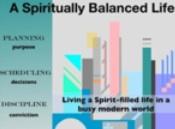
 Ecclesiastes 4:4-5:7
Ecclesiastes 4:4-5:7
The Bible Teaching Commentary
Avoiding Extremes: Finding the Balanced Life
Bible Study Questions
Paul J. Bucknell
______________________
Finding the Balanced Life from Ecclesiastes
We are greatly influenced by those things in and around us, much more than we think. It is easy to be living out of balance without even knowing it. Our lives are much like a leaf dropped into a raging river. We are driven by the confluence of our passions and major trends of society.
In the following verses Solomon leads us down a path pointing out on the left and right some major snares people fall into through their lives. A fulfilling life is only attained when we step away from these pitfalls and observe certain key biblical principles. Here are four: A) Balance between work and rest, B) Making time for others, C) Content with your place in life, and D) Humility in the presence of God.
___________________
Icebreaker: Describe a leaf falling into a raging river and being driven away. Share how each of us are influenced by different factors in our lives. Ask them to share how a certain desire, social trend, political decision, fear, philosophical thought, etc. influenced their lives for the good or bad.
A) Balance Between Labor and Rest (Ecclesiastes 4:4-6)
Many a person run through life so quickly that they never stop and enjoy it. Others think a life without work is best. Notice Solomon's balanced advice.
4:4 And I have seen that every labor and every skill which is done is the result of rivalry between a man and his neighbor. This too is vanity and striving after wind. 4:5 The fool folds his hands and consumes his own flesh. 4:6 One hand full of rest is better than two fists full of labor and striving after wind. (Ecclesiastes 4:4-6, NASB).
- What does he observe in verse 4? Is this something you have seen? Name 2 to 3 various activities such as buildings, events, sports, education, etc in which this phenomena occurred.
- Why does man compete? Is it good or bad? Should we, as some suggest, exclude the opportunity to win in children's sports? Do you agree with Solomon that it is vanity?
- Describe what verse 5 refers to.
- The folded hands represent a lazy person (cf. Proverbs 21:25; 24:33). He figures he is the smart one to get others to work for him! What is wrong with having an easy life where one does not need to work? Why should we work? Where did the work ethic come from?
- Explain the point of the picture that the Preacher paints in verse 6?
- The best life consists of work and rest. Refer to Genesis 2:2-3 and Exodus 20:9-10 and share why this is so. Is your tendency to work and not rest or rest and not work? Name one way to insure a balanced life for you and your family.
B) Making Time for Others (Ecclesiastes 4:7-12)
With the surge of interpersonal relationship problems, people want to go it alone. But we were not made to be or live alone. Solomon's arguments for synergy will help you better value others.
4:7 Then I looked again at vanity under the sun. 4:8 There was a certain man without a dependent, having neither a son nor a brother, yet there was no end to all his labor. Indeed, his eyes were not satisfied with riches and he never asked, "And for whom am I laboring and depriving myself of pleasure?" This too is vanity and it is a grievous task. 4:9 Two are better than one because they have a good return for their labor. 4:10 For if either of them falls, the one will lift up his companion. But woe to the one who falls when there is not another to lift him up. 4:11 Furthermore, if two lie down together they keep warm, but how can one be warm alone? 4:12 And if one can overpower him who is alone, two can resist him. A cord of three strands is not quickly torn apart..
- What kind of man does he describe in verse 4:8?
- Have you seen this situation before where man works so hard but never really questions the reason for it? Is man's value merely defined by the work that he accomplishes? Should time with the family give way to demands at work? How can we resolve this tension found in modern society?
- The main thought for verses 9-12 is stated in verse 9, "Two are better than one." How does he defend this in this same verse?
- Verses 10, 11 and 12 all support this theme. State how they support the 'two are better than one' concept. Give an example where you have found this to be true.
- What trends in modern society tend to pull apart relationships? Reflect on your relationships with others and observe your own responses to these tensions. Include your family and church relationships.
C) Content with Your Place in Life (Ecclesiastes 4:13-16)
Do not live for ambition or fame. Instead always seek to learn, grow and make wise choices. Trust God for your position.
4:13 A poor, yet wise lad is better than an old and foolish king who no longer knows how to receive instruction. 4:14 For he has come out of prison to become king, even though he was born poor in his kingdom. 4:15 I have seen all the living under the sun throng to the side of the second lad who replaces him. 4:16 There is no end to all the people, to all who were before them, and even the ones who will come later will not be happy with him, for this too is vanity and striving after wind.
- What crippled this old foolish king spoken of in verse 13? What lesson are we to lean from this old foolish king?
- What happens to this poor hapless lad in verses 13-15? Who did King Solomon know that was much like this poor lad?
- Verse 16 indicates that this new ruler will have a group to oppose him later too. Why might that happen? What is the pattern here? What can we learn from it?
- God is ultimately in charge of getting ahead. How do ambitious people allow pride and selfishness combined with position lead to a heart unwilling to learn (v. 13)? Contentment is the better life because it is based on trusting God for promotion and success. He doesn't have to have it to have a good life. He seeks after living the right way rather than gaining position. Are you content?
D) Humility in the Presence of God (Ecclesiastes 5:1-7)
People in a modern society are too busy to think much about God unless He can help them further their purposes. Most are agnostics but it is better to be humble and fear God than to carelessly say things before God. After all, God might be listening in!
5:1 Guard your steps as you go to the house of God, and draw near to listen rather than to offer the sacrifice of fools; for they do not know they are doing evil. 5:2 Do not be hasty in word or impulsive in thought to bring up a matter in the presence of God. For God is in heaven and you are on the earth; therefore let your words be few.
5:3 For the dream comes through much effort, and the voice of a fool through many words. 5:4 When you make a vow to God, do not be late in paying it, for He takes no delight in fools. Pay what you vow! 5:5 It is better that you should not vow than that you should vow and not pay. 5:6 Do not let your speech cause you to sin and do not say in the presence of the messenger of God that it was a mistake. Why should God be angry on account of your voice and destroy the work of your hands? 5:7 For in many dreams and in many words there is emptiness. Rather, fear God.
- What is the first step of advice when speaking before God (5:1)?
- Man tends to be so boastful over his thoughts and dreams. Why would the advice given in 2-3 help moderate our tendency to justify our plans before God (2-3)?
- What is a vow? Why do people make vows? What is the advice given in verses 4-6 for those making vows? What vows have you made? Have you kept them? What ways could you improve?
- Verse 7 summarizes the previous verses. How would you rephrase this verse in your own words? How is fearing God different than talking much in God's presence?
E) Summary Discussion on Obtaining a Balanced Life
Solomon given us clear advice on how to avoid the extremes of life. Here are four questions focused on applying them to your life..
- Are you personally aware of the need for balance between work and rest? How do you resolve this tension in your own life? How might you be challenged in this area of life in the days ahead?
- Relationships are key to a fulfilled life. Are you frustrated with how to form and keep good relationships or does it come easy to you? Explain.
- What status do you have in life? Are you content where you are at? Are you able to trust God with success or failure or do you have a "I must accomplish …. " type of attitude?
- Are you confident about the way you conduct your life? If you are, you might be prideful and assertive rather than humble and God-fearing. Which are you? What do others think?



